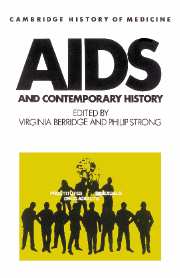Book contents
- Frontmatter
- Contents
- Notes on contributors
- Acknowledgements
- Introduction: AIDS and contemporary history
- I The pre-history of AIDS
- 1 AIDS and the regulation of sexuality
- 2 Public health doctors and AIDS as a public health issue
- 3 Politics and policy: historical perspectives on screening
- 4 Testing for a sexually transmissible disease, 1907–1970: the history of the Wassermann reaction
- 5 The politics of international co-ordination to combat sexually transmitted diseases, 1900–1980s
- 6 Hepatitis B as a model (and anti-model) for AIDS
- II AIDS as history
- Appendix AIDS: the archive potential
- Index
- Cambridge history of medicine
2 - Public health doctors and AIDS as a public health issue
Published online by Cambridge University Press: 14 October 2009
- Frontmatter
- Contents
- Notes on contributors
- Acknowledgements
- Introduction: AIDS and contemporary history
- I The pre-history of AIDS
- 1 AIDS and the regulation of sexuality
- 2 Public health doctors and AIDS as a public health issue
- 3 Politics and policy: historical perspectives on screening
- 4 Testing for a sexually transmissible disease, 1907–1970: the history of the Wassermann reaction
- 5 The politics of international co-ordination to combat sexually transmitted diseases, 1900–1980s
- 6 Hepatitis B as a model (and anti-model) for AIDS
- II AIDS as history
- Appendix AIDS: the archive potential
- Index
- Cambridge history of medicine
Summary
Most of the literature on HIV infection makes at least passing reference to ‘public health’. However, the meaning of the term varies enormously. The public health implications of AIDS may be identified as the ways of protecting the population from infection, or, especially in the USA, may raise the issue of how to provide health care services for persons with AIDS within a badly fragmented system that offers only limited access. The public health issues arising from HIV are usually agreed to cover its epidemiology, to which disease control centres in both Britain and the USA have made the major contribution, and also the controversial debates arising from the interpretation of epidemiological data, which have focused on the protection of civil rights in face of measures to test for and control the spread of the infection. The behavioural changes believed to be necessary to prevent the infection may also be referred to under the heading of public health education. The lack of clarity that marks the discussion of public health in the literature merely reflects the wide-ranging – some would say, less flatteringly, ‘rag-bag’ – nature of public health ideology and practice in the mid- and late twentieth century. Since the heroic battles of the nineteenth century for clean water and sanitation, and against infectious disease, the identity of public health as a specialty and in its relations to medicine has been far from clear.
- Type
- Chapter
- Information
- AIDS and Contemporary History , pp. 37 - 54Publisher: Cambridge University PressPrint publication year: 1993



